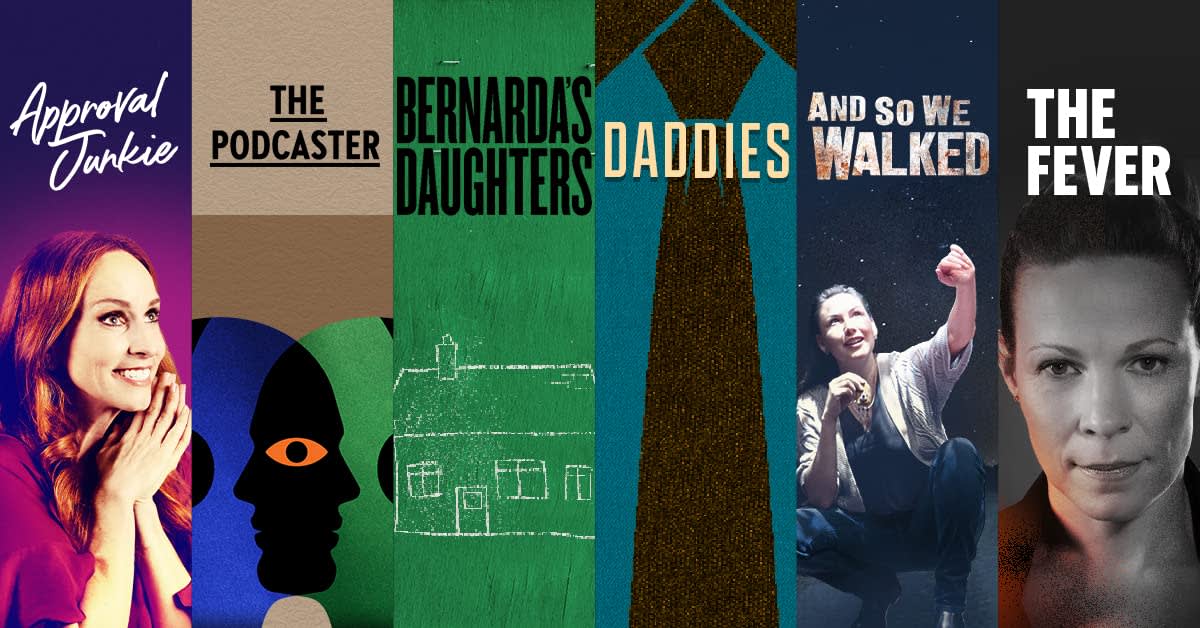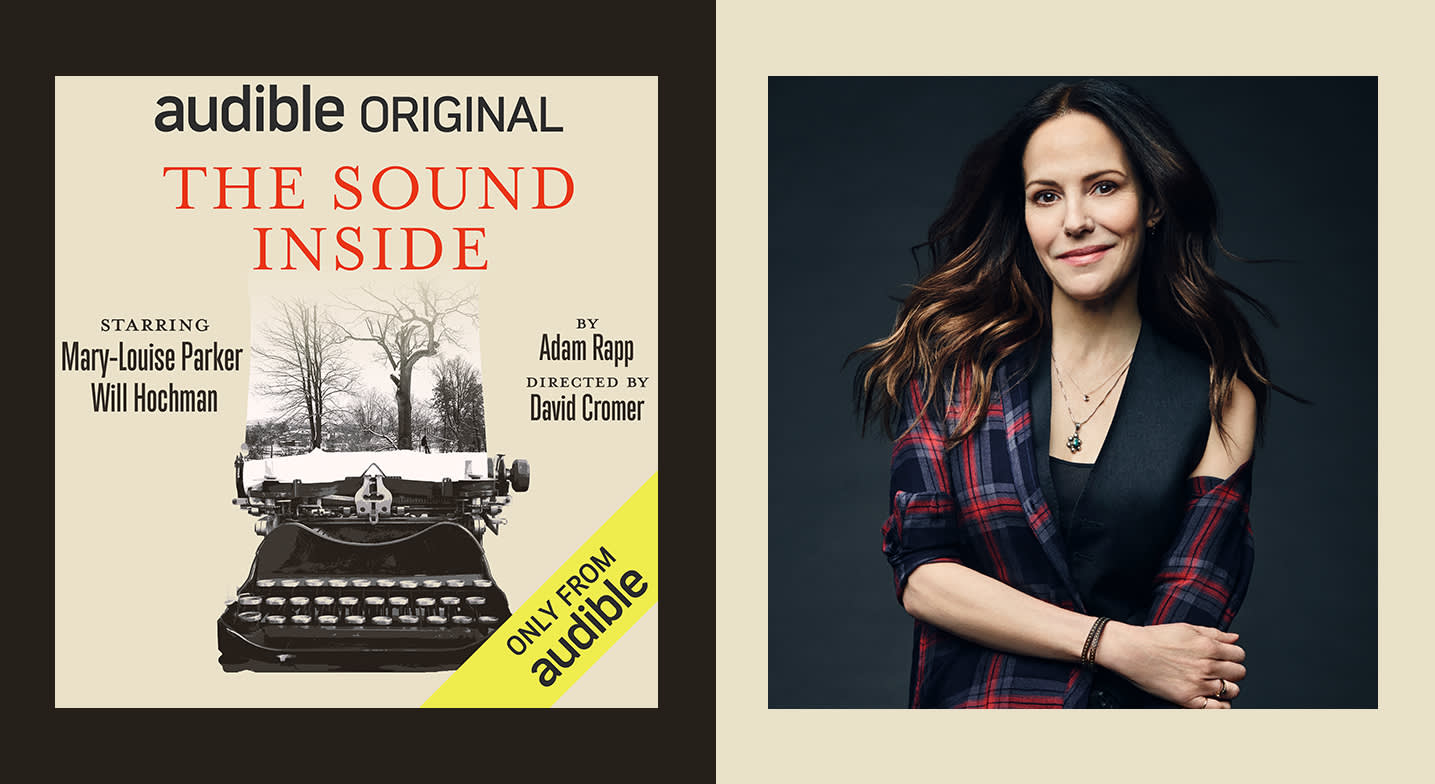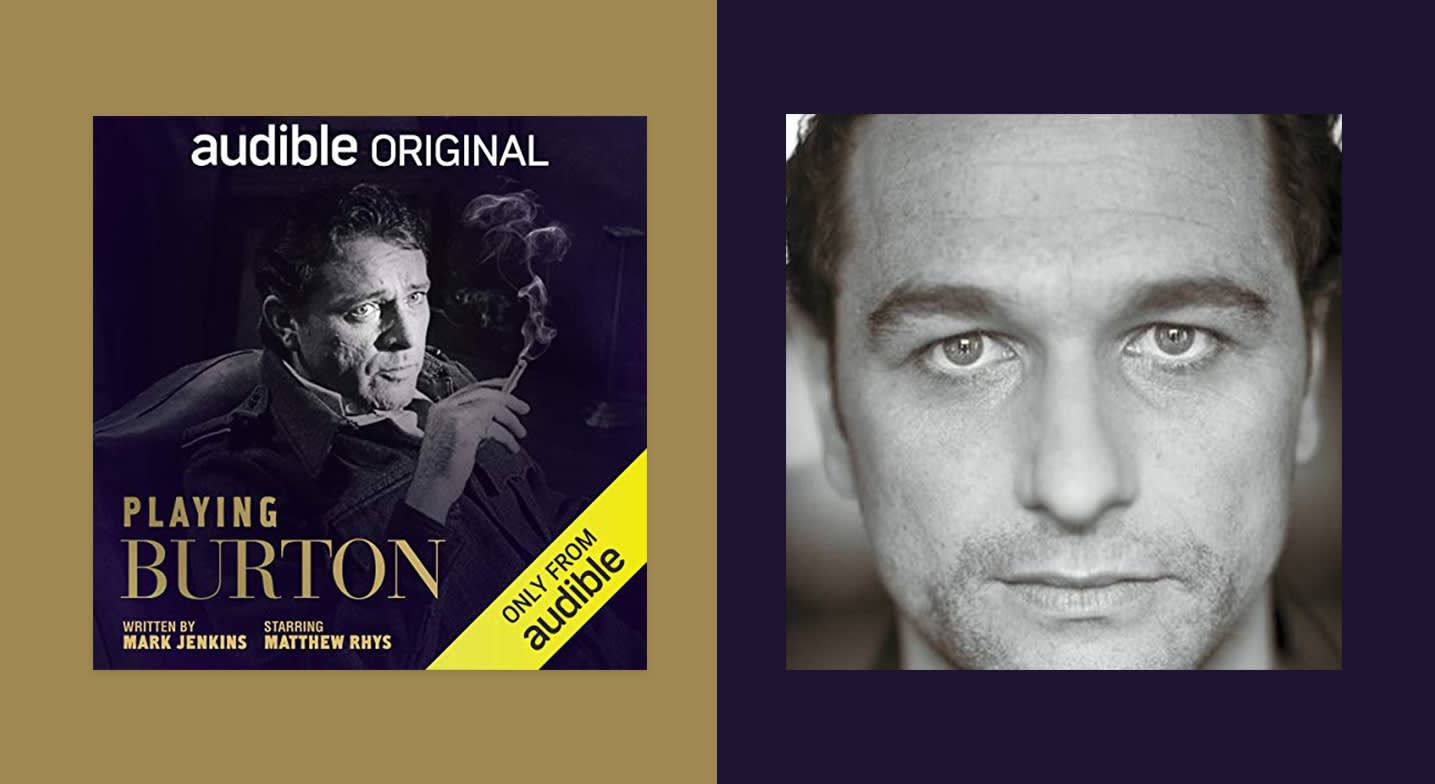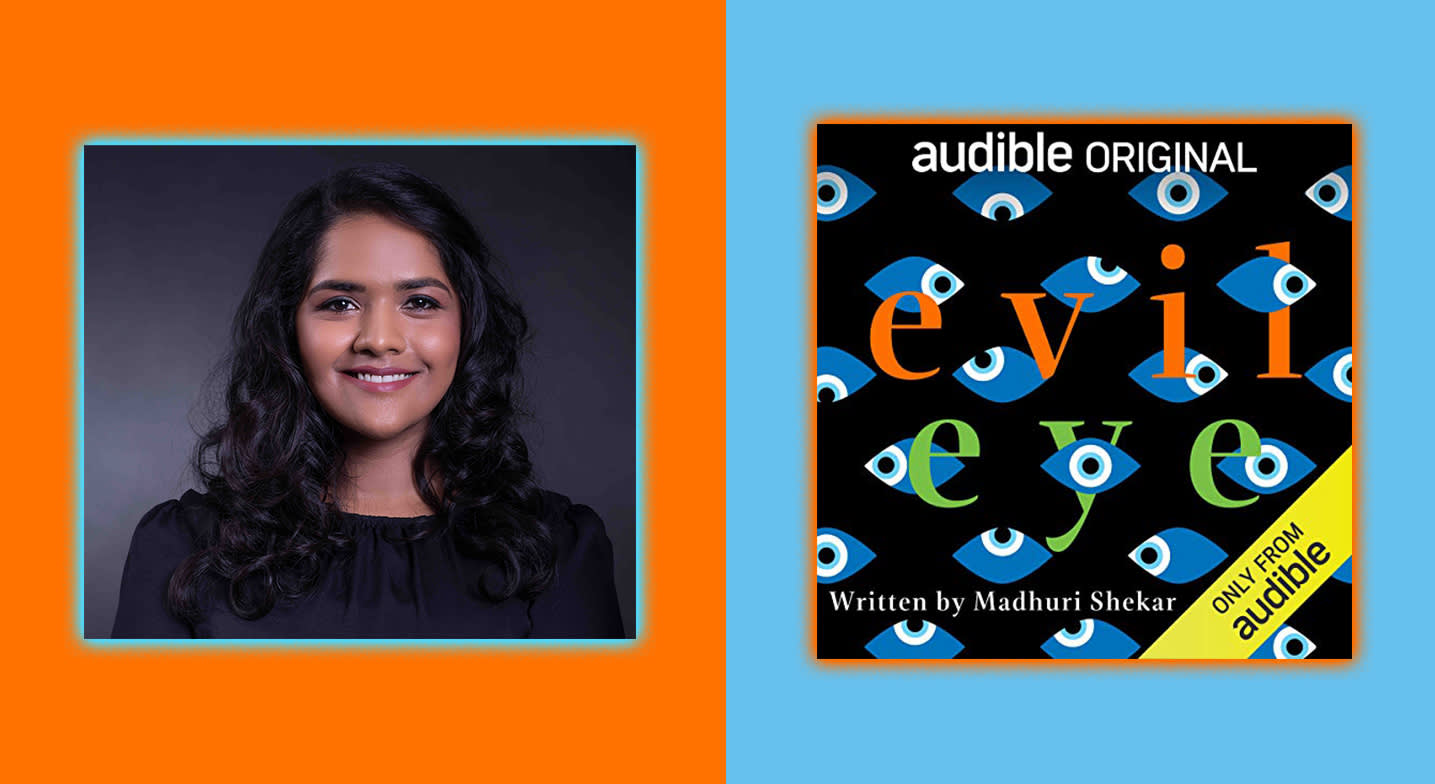We were thrilled when the Minetta Lane Theater, Audible's home for live storytelling, reopened its doors this past October, after being shuttered since the start of the pandemic. But even if you can't make your way to New York City to experience some of these performances in person, Audible Theater is serving up a spring lineup of six amazing new shows. NPR journalist Faith Salie dives deep on her people-pleasing addiction in Approval Junkie, while Wallace Shawn and Lili Taylor serve up a brutal self-reckoning truth bomb with The Fever. We've also got a lyrical play inspired by a beloved classic, and an inspiring true story about a woman's journey to discover her Cherokee roots. Finally, we have two commissions from our Emerging Playwrights program, including a meta thriller from inside the world of podcasting, and a surprisingly twisty take on the journey to fatherhood. Explore all of these below, as well as everything Audible Theater has to offer here.
Save this list to your Library Collections now.
Approval Junkie by Faith Salie
As a Gemini, people-pleasing is in my blood: It’s called validation and I need it! If you’re thinking, "You should work on that," you’d be right. In the meantime, however, I feel incredibly seen after experiencing Faith Salie’s memoir-based play, Approval Junkie. Faith was set to perform her play at the Minetta Lane Theatre in March 2020 but, like the rest of Broadway, Audible had to cancel the production due to the pandemic. I was lucky enough to finally be able to see her live this past November, and it did not disappoint as she owned that stage with energy and charisma, sharing tales of tough crowds she’s faced, her need to people-please and gain their approval, ultimately leading her down the road to self-acceptance. The performance made me feel all my feels—while having so much fun.
From body issues to failed relationships to career struggles, she reveals her need for approval with vulnerability and courage. The words she employs on a topic many women can relate to—the desire to be professionally successful while being a good mother—are powerful, touching on the challenges that occur when you try to do both, along with the judgment that comes with it. Faith remains honest and heartfelt, while continually providing comic relief. Like when she describes the time a talent agent suggested she get bangs in order to get a leg up in the business. I flash backed to breakups and tough times that led me to the decision to cut my own hair off, always thinking it would solve my problems, followed by instant regret. I was not alone!
It’s just as enjoyable experiencing it all over again now. Since Approval Junkie was recorded live, you have the bonus of hearing the audience reaction, so with my headphones on, it feels like sitting on the couch with a best friend. Anything but conventional, this listen is vanilla—in the best way! Since, as Faith explains, vanilla "enhances everything: Its goodness is constant." —Caitlyn L.
The Fever by Wallace Shawn
In October Audible re-opened its Minetta Lane Theater doors—for the first time since the emergence of COVID—with a limited-run revival of Wallace Shawn's Obie Award-winning play The Fever, starring Lili Taylor in the role of the nameless protagonist. Originally created in 1991 and performed by Shawn himself, often in private homes by appointment, The Fever still feels (perhaps depressingly) current, thanks to its timeless truths about the fictions and lies that pad out the lives of the privileged.
We meet the unnamed main character as she’s sick in bed (and, periodically, on the bathroom floor) with fever while staying at a hotel in a war-torn country. Though Taylor (Six Feet Under, Mystic Pizza) embodies this role here, it's important to note that the character is intentionally ambiguous, an everyperson, without name or defining characteristics such as age or gender. Even the language of the narrator (though obviously English for the purpose of this play) is obscured. The life of this character is meant to be universally relatable… to a point. The only defining characteristics about them are things that Shawn's original audience—as well as today's—likely all share: comfort, safety, privilege, and money. Lili Taylor, in her trademark voice that exudes naiveté and wonder, pulls the listener into her small room and her delirium, where she is in the throes of an existential crisis about the nature of capitalism and her unearned place in the world's hierarchy. The claustrophobia of her anxiety is all-consuming here, and one can imagine that listening to this without visual cues may be more powerful than witnessing it on stage. You are in her mind; her panic becomes yours.
The listener can sense in the trajectory of the story many potential influences of past writers on the topic of injustice: the despair of Sylvia Plath; the practicality of Elizabeth Gaskell; the dystopian imaginings of George Orwell; the rage of Kurt Vonnegut. In the end, however, The Fever is just so very Wallace Shawn, a rant that's somehow both rambling and entirely lucid, biting and sharp—and pointed right at you. —Emily C.
Bernarda's Daughters by Diane Exavier
Bernarda's Daughters
By Diane Exavier
Narrated by Amara Brady, Jasmin Walker, Lorraine Toussaint, Malika Samuel, MaYaa Boateng, Zenzi Williams
Federico Garcia Lorca’s play, The House of Bernarda Alba, remains one of the great 20th-century texts about female oppression. Completed in 1936, two months before the poet and playwright’s death during the Spanish Civil War, it’s centered around a mother who keeps her daughters caged in a state of mourning, and the themes continue to resonate—one of the reasons it’s continually produced and adapted for contemporary audiences. Diane Exavier's original play, Bernarda's Daughters takes Lorca's classic as a jumping off point and rejuvenates the idea in stunning ways, using electric language and graphic descriptions that throb with heat and passion.
It's set in present-day Flatbush, a gentrifying neighborhood of Brooklyn, New York, and—amid the cacophony of building construction, street protests, and anti-immigration bias—we listen as the five Abellard sisters bicker and gossip during the heat of summer. “Can I say that in this house, between these walls?” one of the sisters asks, and we know we’re about to hear unvarnished truths and secrets that wouldn’t be told outside of this protected space. Their mother is notably absent, having returned to Haiti to handle her dead husband's affairs, and the children each strive to figure out what comes next, facing long-simmering disappointments and their anger at the limitations placed upon them as they yearn to be free. The talented cast of six women—Mayaa Boateng, Amara Brady, Malika Samuel, Lorraine Toussaint, Jasmin Walker, Zenzi Williams—keeps the dialogue rollicking as they pivot from relentless teasing to poignant moments that expose fears and raw grief. Exavier's language is fierce and poetic, at turns startling in its depiction of sexuality and desire and tender in the way she explores love and loneliness, mercy and forgiveness. —Jerry P.
The Podcaster by Christopher Chen
The Podcaster
By Christopher Chen
Narrated by Ato Blankson-Wood, Corey Stoll, Erin Markey, Michael Braun, Peter Kim, Quincy Tyler Bernstine, Stacey Yen
Christopher Chen’s brilliantly destabilizing The Podcaster moves so fluidly that you might not know the ground has shifted until you’re already fully afloat, adrift on a cosmic plane with the play’s haunting clues twinkling like stars, tempting you to follow them, as if any represents a single answer.
But let’s get back to earth for a moment. It all started in that most familiar of audio formats: a podcast. Sylvia Chang hosts Art Beat, a series of lively and sometimes prickly conversations with artists in a range of mediums, from literature and visual art to standup comedy. Sylvia’s truly engaged—she wants real answers to her questions, even if the artist is surprised by her interpretations or attempts to deflect. She interviews an acclaimed novelist who warms to her attention until he realizes she has her own ideas about what his work means, and she chats with a comedian who uses a laugh track to invest her work with “authority” for the audience. Patterns emerge: the idea of the quest as a worthy subject for art and life; the question of control in a narrative; the blurry edges of art, the subconscious, and reality. Abruptly, Sylvia goes missing, and another host takes over. Then we’re in another podcast, this one following a mysterious woman known as The Hunter, an orange-eyed seer on a search only she seems to understand. In a knowing sendup of podcast culture, a podcaster is obsessed with her, and now he’s on his own quest.
It helps to know that Christopher Chen is an Obie Award-winning playwright, renowned for his kaleidoscopic storylines, including Caught, an experimental play investigating structures of power and truth, and directed by Lee Sunday Evans, who also directs The Podcaster. This work was commissioned by Audible’s Emerging Playwrights Fund, and true to that program, it brings a concept from a visionary voice in theater specifically for the listening experience. An acclaimed cast, led by Ato Blankson, Corey Stoll, Erin Markey, and Michael Braun, immersive sound design, and the familiar signposts of podcast storytelling make The Podcaster an entertaining (and often, very funny) listening experience that can be easily followed on a surface level. But enter its Lynchian hall of mirrors, and you might be tempted to listen again, all the better to revel in its dazzling echoes and cosmic current of questions. —Kat J.
Daddies by Paul Kruse
Daddies
By Paul Kruse
Narrated by Barbara Chisholm, Gabriel Vaughan, Hale Appleman, Jennifer Kidwell, Karina Kruse, Ken Bolden, Mark Linn-Baker, Mary Poole, Piper Goodeve, Sydney Harcourt, Tonilyn A. Sideco
After two years of coronavirus quarantines and isolation, punctuated by embarrassing and monotonous video meetings (“You’re muted, we can’t here you!”), we’ve now reached the inevitable point when we’re processing our collective uncertainty through storytelling about the ongoing pandemic. In Daddies, a new dramedy commissioned by Audible’s Emerging Playwrights Fund set during the first wave of the 2020 shutdowns, playwright Paul Kruse uses the digital lingua franca of our times to craft a queer love story that morphs into a chilling tale about longing and the long-lasting ramifications of our present-day choices.
We’re first introduced to Joseph (wonderfully performed by Hale Appleman), after he’s relocated to his hometown of La Crosse, Wisconsin, to take care of his father who’s recovered from the virus. We join as he leads a group of older clients via Zoom who are mid-debate about the merits of James Baldwin’s The Fire Next Time as they simultaneously learn computer skills and, hopefully, how to be an antiracist. It’s a comically cringe-inducing discussion that’s typical of his gig at Boomerang, a company that provides IT support and facilitates social justice training. Next, Joseph’s on the phone with his best friend Amber (Jennifer Kidwell) back in New York City, who asks if he’ll be the sperm donor so she and her trans masculine partner can get pregnant. But Joseph is horrified by the idea and can’t imagine why anyone would want to bring a child into the world in its current state, so their easy banter erupts into an intense argument. Soon he’s filling spare time by looking for a connection in the small town, so he turns to Hinge (“I want my Pete Buttigieg”) and meets an older “daddy” (Sydney Harcourt), who he tries to Zoom date.
After a series of peculiar wrong numbers and strange coincidences, things turn creepier, and a speculative plot twist arises that’s impossible to see coming—until it’s too late. Oscillating between witty humor and anxious bafflement, Daddies explores the dread of our current reality, reaffirming our need to make fulfilling connections no matter what. —Jerry P.
And So We Walked by DeLanna Studi
DeLanna Studi’s solo performance of And So We Walked: An Artist’s Journey Along the Trail of Tears is one for the ages. DeLanna is a “mixed blood”—half Cherokee, half white—in the middle of a deep and difficult struggle with her identity. This play is a personal story of her attempt to form new connections to her Cherokee heritage and relatives, both past and present. But she especially wants to connect with her father, so she decides to walk the Trail of Tears with her dad.
As DeLanna’s character explains, the Trail of Tears is often not a part of public school curriculums because they’d rather pretend it never happened. While she literally, and figuratively, walks the trail, it takes on hopeful and fearsome connotations as she finds parallels to her own journey through life. She realizes that Cherokee parents, wanting to shield their children from being inflicted with the same oppression and trauma they experienced, have kept secrets from their kids. Then comes DeLanna’s realization that she’s keeping her own secrets—quite literally in a mysterious box. When she finally releases what’s hidden inside, what will emerge? A feathered monstrosity? Her own rebirth? Through this incredible solo performance, DeLanna grapples with “trying to walk that thin line between the traditional and the modern”—a theme that will resonate with anyone who seeks to belong and struggles with their identity in multigenerational or mixed families. —Sean T.










